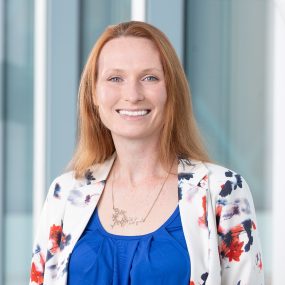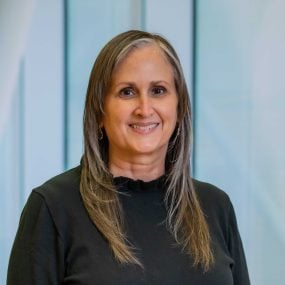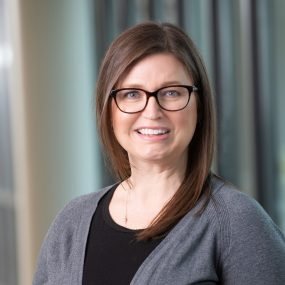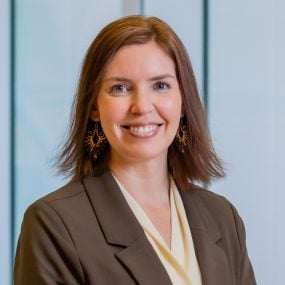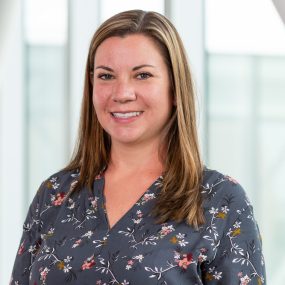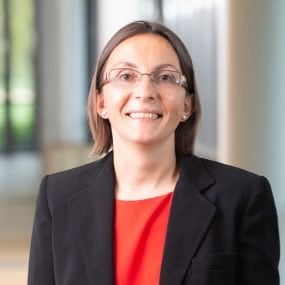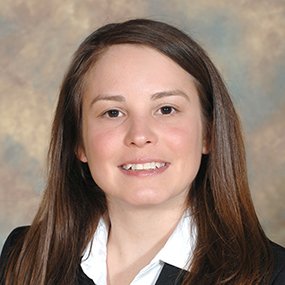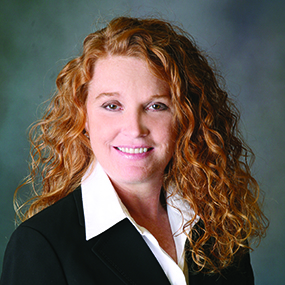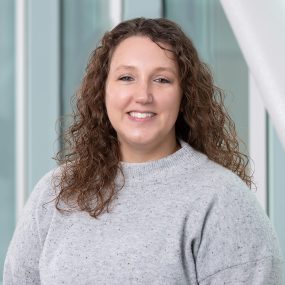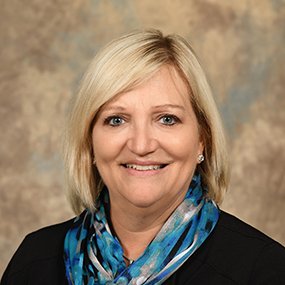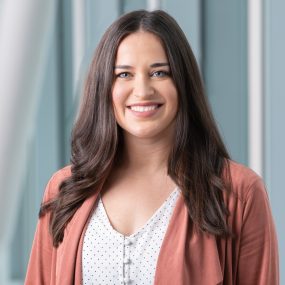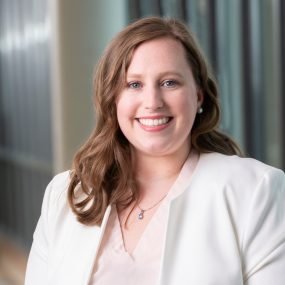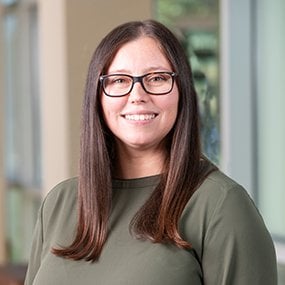Eating Disorders Treatment Program
An eating disorder is a serious disease, but there is a path to long-term recovery. Lindner Center of HOPE’s eating disorders treatment program helps struggling individuals find the strength to confront and overcome the root causes of their disease and live a fulfilling life committed to health and balance.
The Harold C. Schott Foundation Eating Disorders Treatment Program at Lindner Center of HOPE
Patients at the Harold C. Schott Foundation Eating Disorders Program at Lindner Center of HOPE are experiencing results.
Lindner Center of HOPE offers a disciplined approach to eating disorder treatment that combines psychiatric management, psychotherapy, nutritional services, and family engagement throughout the entire process. Board certified clinicians offer the wisdom, compassion and proven treatment modalities to successfully treat complex illnesses such as eating disorders, returning patients, and their loved ones, to more fulfilling lives.
The Harold C. Schott Foundation Eating Disorders Treatment Program at Lindner Center of HOPE includes services for adults and adolescents, across the gender spectrum, while also incorporating research.
Click here to view a special Venue Magazine article featuring Lindner Center’s Eating Disorders Treatment Program.
For an initial assessment and consultation with a licensed therapist at Lindner Center of HOPE, call 513-536-HOPE (4673). Assessment includes a 50-minute session with a licensed therapist. The initial assessment is covered by most major insurance plans.
Eating disorders can affect individuals of any age, gender or ethnic background. While the potential warning signs may vary significantly, these are general signs for eating disorders:
- Preoccupation with body shape and/or weight
- Weight disturbances or unexplained weight changes (underweight, overweight or obese)
- Hoarding high-calorie food
- Obsession with diets, calories, food, or nutrition
- Compulsive eating, binge eating, or inability to stop eating
- Frequent rigorous dieting, regardless of body weight
- Compulsively arranging food and/or cutting into tiny pieces
- Eating alone or late night eating
- Rigidity around food – eating only particular types of food and/or at certain times
- Emotional overeating
- Taking laxatives or diet pills or excessive exercising to prevent weight gain
- Avoiding eating in public and social situations that involve food
- Repeatedly going to the bathroom shortly after meals
- Regular fasting
Qualified eating disorders treatment professionals at Lindner Center of HOPE have the experience and tools to identify eating disorders and possible co-occurring conditions. Often, patients are aware that they need help for an eating disorder, but do not realize that another mental disorder may be the root cause or may be exacerbating symptoms or behaviors.
The clinicians at Lindner Center of HOPE specialize in understanding co-occurring conditions. They use a combination of established protocols and current research to reveal underlying causes. These proven techniques help them truly understand the complex nature of co-occurring conditions, recommend the appropriate level of care, and create a tailored treatment plan.
Causes of Eating Disorders
Nearly 30 million adolescents and adults in the United States suffer from eating disorders, including anorexia nervosa, bulimia nervosa, binge eating disorder, avoidant and restrictive food intake disorder, or compulsive exercising.
Eating disorders are mental illnesses caused by numerous factors. They can impair normal functioning, hinder mental health and present significant health risks. They often co-occur with other mental disorders, such as depression. Lindner Center of HOPE can help.
A variety of possible genetic, medical, psychological and environmental factors can influence eating disorders. They may include:
- Genetic (or hereditary) factors
- Neurochemical differences
- Biologic changes that occur secondary to weight loss and malnutrition
- Individuals with certain temperament or personality features, such as perfectionism and obsessionality, may be more susceptible to developing eating disorders.
- Conflicting social messages about nutrition and extreme thinness can influence the development and treatment of eating disorders.
Lindner Center of HOPE’s center for eating disorders creates individualized treatment plans to help patients succeed
Every patient begins successful treatment with a thorough initial assessment and consultation with a licensed therapist. This initial assessment is generally covered by major insurance plans.

Upon an initial assessment, patients receive a personalized treatment plan. Patients who choose treatment at the Harold C. Schott Foundation Eating Disorders Treatment Program at Lindner Center of HOPE are provided with a plan for combating the eating disorder. The plan may include a combination of Family Based Therapy, individual and group psychotherapy, meal planning and support, nutritional education and counseling, medical monitoring and exercise assessment, control interventions, and psychiatric management, to support the patient throughout treatment, equipping the patient with the tools and support he or she needs for continued success at home.
Lindner Center of HOPE effectively treats a range of eating disorders, including anorexia nervosa, bulimia nervosa, binge eating disorder, avoidant and restrictive food intake disorder, and compulsive exercising.
For adults, treatment for eating disorders at Lindner Center of HOPE is available through inpatient care, outpatient care, intensive outpatient care and an eating disorders partial hospital program (PHP).
Treatment team members also offer outpatient assessment and treatment through Lindner Center of HOPE Professional Associates (LCOHPA).
Research studies and the advances they lead to are closely integrated into the evidence-based treatment programs provided at Lindner Center of HOPE. The Research Institute at Lindner Center of HOPE consistently manages eating disorder-related studies that are working to test new treatment options and increase the knowledge-base about eating disorders.
Eating Disorder Treatment Program Intake Form
Complete this automated form one week prior to your scheduled initial assessment with a licensed therapist at Lindner Center of HOPE. Once form is completed, please print and bring to your initial appointment.
Outpatient Care for Eating Disorders
![]() Comprehensive outpatient services for eating disorders led by experts in the clinical practice group, Lindner Center of HOPE Professional Associates (LCOHPA), establish an individualized treatment approach that allows patients struggling with eating disorders to participate in meaningful therapy, support and recovery groups. Families also receive extensive support and education on understanding and working with the loved one suffering from an eating disorder. Outpatient treatment helps patients continue their recovery while maintaining normal life activities.
Comprehensive outpatient services for eating disorders led by experts in the clinical practice group, Lindner Center of HOPE Professional Associates (LCOHPA), establish an individualized treatment approach that allows patients struggling with eating disorders to participate in meaningful therapy, support and recovery groups. Families also receive extensive support and education on understanding and working with the loved one suffering from an eating disorder. Outpatient treatment helps patients continue their recovery while maintaining normal life activities.
Who Benefits
- Adults and adolescents across the gender spectrum (10 and older) with eating disorders who are able to participate successfully in regularly scheduled outpatient visits and who are not at medical risk
- Family members who are struggling with a loved one’s eating disorder
Inpatient Treatment for Eating Disorders
The clinicians at Lindner Center of HOPE understand that eating disorders are a form of mental illness. That’s why patients with eating disorders live and receive therapy side-by-side with patients facing other mental illnesses. However, Eating disorders have the highest risk of death of any mental illness. Due to this concern, stabilization is necessary to save lives. Treatment is provided in a positive, open care environment with 24-hour support every day.
Adults struggling with eating disorders may benefit from stabilization through an inpatient hospitalization. Lindner Center of HOPE offers inpatient treatment for eating disorders on two adult inpatient units with care managed by members of the Harold C. Schott Foundation Eating Disorders Program.
Effective, inpatient treatment for eating disorders includes:
- A multidisciplinary approach combining psychiatric management and nutritional services
- Personalized treatment plans
- Monitoring and reduction of refeeding risk
- Frequent assessment of labs and subsequent correction of electrolytes and vitamin deficiencies
- Dietitian guided advanced meal planning to reach appropriate nutrition level
- Monitoring of orthostatic vital signs
- Daily blinded weights
- Weight restoration to step down to partial hospitalization or residential
- Management of co-occurring psychiatric disorders
The treatment team works with each patient to confront personal challenges and break the cycle of disordered eating.
Through a unique collaboration, Cincinnati Children’s at Lindner Center of HOPE, staffed by the Harold C. Schott Eating Disorders Treatment Team, provides care to adolescents suffering with eating disorders. We offer a center of excellence, in a serene, therapeutic environment for the care and treatment of adolescents. To read more about Cincinnati Children’s Hospital Medical Center’s mental health programs, click here.
Who Benefits from Inpatient Treatment for Eating Disorders
- Adults or adolescents across the gender spectrum (12 and older) who are struggling with eating disorders
- Patients who have not progressed in recovery with other treatment programs or whose eating disorder has led to dangerous medical consequences
Click here to download the patient referral form.
Partial Hospitalization for Eating Disorders
This intensive treatment option provides a therapeutic, supportive environment for patients age 12 and older struggling with eating disorders. Lindner Center of HOPE staff provide adult partial hospitalization programming. This program can assist patients transitioning from an inpatient stay to daily routine and home environments. Families also receive extensive support and education on understanding and working with the loved one suffering from an eating disorder. Partial hospitalization can also be considered as a treatment alternative to full hospitalization.
For adults, treatment for eating disorders at Lindner Center of HOPE is available through inpatient care, outpatient care and an eating disorders partial hospital program (PHP).
Who Benefits
- Individuals (ages 12 and older) who are facing the challenges of an eating disorder, and their parents or family members
- Patients who need a more intensive, structured program than traditional outpatient visits can provide
- Patients who may not require hospitalization, but who may benefit from hands-on intensive day-long therapy without requiring an overnight stay
- Patients transitioning from hospitalization who need on-going, intensive care
Learn more about partial hospitalization for adults here.
Eating Disorder Intensive Outpatient Program at Lindner Center of HOPE
The Eating Disorder Intensive Outpatient Program at Lindner Center of HOPE (EDO IOP) is a treatment program designed to provide more intensive treatment for eating disordered patients for those who are not benefitting from outpatient treatment but do not meet criteria for partial hospitalization or inpatient treatment. The goals of EDO IOP are to continue weight restoration, nutritional support and planning, develop coping skills, and to assist patients in the management of their disease and symptoms to the point that traditional outpatient services will be effective. EDO IOP is often used as step-down treatment from partial hospitalization with the intent of transitioning the patient back into their home environment and healthy routines. As such, EDO IOP is a cost effective option for patients who meet admission criteria for this program.
EDO IOP traditionally operates Tuesday through Friday from 3:00 PM – 6:00 PM on the campus of the Lindner Center of HOPE at 4075 Old Western Row Road, Mason, 45040. Alternative days will be identified when programming is closed due to holidays. Patients are expected to arrive at 2:30 for check in. Weight checks will occur on Tuesday at 2:30 and as needed on other days. Patients will also be expected to schedule with an individual therapist specialized trained in eating disorders at Lindner Center of HOPE on Mondays during the duration of the program. Duration of the program is based on individual progress towards established goals.
Who Benefits
The Eating Disorder Intensive Outpatient Program at Lindner Center of HOPE (EDO IOP) is a treatment program designed to provide intensive treatment for eating disordered patients who do not meet criteria for partial hospitalization but who are not stable enough to be treated in the traditional outpatient setting. The goal of EDO IOP is weight restoration, nutritional support and planning, instruction of cognitive coping skills, and to assist patients in the management of their disease and symptoms to the point that traditional outpatient services will be effective. EDO IOP is often used as step-down treatment from partial hospitalization with the intent of transitioning the patient back into their home environment and healthy routines.
Learn more about the Eating Disorder Intensive Outpatient Program.
Research Programs to Advance Eating Disorders Treatment
The Research Institute at Lindner Center of HOPE, in affiliation with the University of Cincinnati (UC) College of Medicine, conducts research to better prevent, diagnose and treat common mental illnesses, including eating and weight disorders. Typically it can take up to 17 years before research findings become fully integrated into routine diagnostics and treatment. However, at Lindner Center of HOPE, research informs patient care each and every day.
Current Research Studies
Research in genetics, brain imaging, psychopharmacology and psychotherapy advances the treatment of eating disorders. The professional staff closely integrates research studies into programs to benefit patients and the treatment of eating disorders. Patients interested in participating in specific studies apply through Lindner Center of HOPE.
Visit the Research Institute page for more information about current studies.
Highly Qualified Team Tailors Treatment to the Individual
The team at the Harold C. Schott Foundation Eating Disorders Program at Lindner Center of HOPE is nationally recognized for their scientifically proven methods and progressive expertise in assessing and treating eating disorders.
Lindner Center of HOPE Library: Resources for Eating Disorders
Are you ready to make a change? Patients facing eating disorders and their families can use these resources to better understand and take the first steps toward treatment and recovery.
Eating Attitudes Test
Take this Eating Attitudes Test for a deeper assessment of a possible eating disorder.
AVAILABLE FOR DOWNLOAD
- Frequently Asked Questions
- Guidelines for Family and Friends
- Eating Disorder Recovery and Stages of Change
- Article: Treating Anorexia with the Maudsley Approach
WEB SITES
National Eating Disorders Association
Eating Disorder Referral and Information Center
Warren County Educational Service Center
NEDA – Studies and blog posts related to co-occurring eating disorder recovery.
Live Another Day: An in-depth guide to recovering from co-occurring eating disorders and substance abuse.
Detox Local: A resource for finding addiction detox centers that will support those with eating disorders.
IN THE NEWS: ONLINE ARTICLES
Brain Image Reveals Eating Disorders
KVOA.com
Tuscon and Southern Arizona News
http://www.kvoa.com/news/brain-image-reveals-eating-disorders/
ARTICLES
Treating Anorexia with the Maudsley Approach
A recent study found over half of adolescent patients receiving family based treatment for anorexia were more likely to experience remission after a year than those treated with traditional therapy methods. This article provides more in-depth information about the study results and how family based eating disorder treatment works.
BOOKS
100 Questions and Answers about Anorexia Nervosa
Sari Shepphirds
Crave: Why You Binge Eat and How to Stop
Cynthia M. Bulik
Diet Survivor’s Handbook
Judith Matz and Ellen Frankel
Eating With Your Anorexic
Laura Collins
Gaining: The Truth About Life After Eating Disorders
Aimee Liu
Health at Every Size
Linda Bacon
Help Your Teenager Beat an Eating Disorder
James Lock and Daniel le Grange
Intuitive Eating
Evelyn Tribole
Life Without ED: How One Woman Declared Independence from Her Eating Disorder and How You Can Too
Jenni Schaefer, Thom Rutledge
Real Gorgeous: The Truth about Body and Beauty
Kaz Cooke
Regaining Your Self: Breaking Free From the Eating Disorder Identity: A Bold New Approach
Ira M. Sacker and Sheila Buff
Skills-based Learning for Caring for a Loved One With an Eating Disorder: The New Maudsley Method
J. Treasure, G.Smith and A.Crane
Surviving an Eating Disorder: Strategies for Family and Friends
Michele Siegel, Judith Brisman and Margot Weinshel
The Beginners Guide to Eating Disorders Recovery
Nancy J. Kolodny, MA, MSW, LCSW
When Your Child Has an Eating Disorder: a Step-by-Step Workbook for Parents and Other Caregivers
Pam Carlton, MD
The Parent’s Guide to Eating Disorders: Supporting Self-Esteem, Healthy Eating, and Positive Body Image at Home
Marcia Herrin and Nancy Matsumoto
When Your Child Is Cutting; A Parent’s Guide to Helping Children Overcome Self-Injury
Merry E. McVey-Noble, Fugen Neziroglu, Sony Khemlani-Petal
Brave Girl Eating, Harriet Brown
Eating disorders screening questions
Please answer yes or no to each of the following:
- Do you ever make yourself sick or vomit because you feel uncomfortably full?
- Do you worry that you have lost control over how much you eat?
- Have you recently lost 15 pounds or more within a 3-month period?
- Do you believe yourself to be fat when others say you are too thin?
- Would you say that food dominates your life?
If you answered yes to 2 or more of the above questions, we recommend that you seek professional advice and consider a formal evaluation.
From Morgan, Reid, and Lacey (1999) The SCOFF questionnaire: Assessment of a new screening tool for eating disorders, Journal of Medical Screening (BMJ), Volume 319, December 4, 1999.
